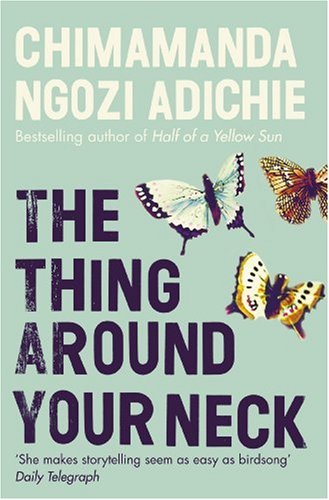A few years back Chimamanda Ngozi Adichie came to a secondary school I was teaching in at the time to do a reading and Q&A session for the senior students there. I hadn't read anything of hers at that stage but was aware of the high acclaim there had been for her novels Half of a Yellow Sun and Purple Hibsicus, so I went along out of curiosity. After she'd finished reading some extracts questions were opened to the floor and a girl put up her hand and asked Adichie where she gets her ideas for characters. The author was a few words into her answer before she stopped and asked the girl if she had read any of her books, as she was going to use a particular character to illustrate her answer. When the girl rather shamefacedly admitted that she hadn't Adichie just laughed before continuing her answer, which was to the effect that her characters are nearly always based on people she's met. Then she said "Maybe one day I'll write a story about a girl who asks questions about books she hasn't read."
Ouch.
Adichie's fierce intelligence, along with her biting (and sometimes petulant) wit are what come through in The Thing Around Your Neck - her first collection of short stories. She is a traditionalist in the sense that there is absolutely no gimmickry to her prose, though she rips into certain conventional values mercilessly. 'Cell One', which I have seen singled out as one of the weaker stories in the collection in other reviews, is an excellent opener to my mind, with an elegance of style that matches the grace under pressure of the narrator, save for one outburst.
High standards are maintained throughout, as Adichie plays through her strengths by sticking to the subject matter she knows, that being conflicts of various sorts in her native Nigeria and the difficult experiences of Nigerian immigrants in the USA. You firmly feel that she is basing these stories on personal experiences, some of which are clearly still very raw. Perhaps a little too raw, in some instances, such as 'Monkey Hill' - a tale of frustrations and condescension at an African writers' conference, where Adichie's obvious desire to lampoon someone leads to a mildly cartoonish depiction of a villain, thus threatening the integrity of what is otherwise a very clever story. Although, as Adichie would be at pains to point out, I wasn't there.
The only other criticism I could make of this collection is that on the one occasion when Adichie chooses to narrate a story from a male perspective I felt my immersion in the book waning considerably, as the story didn't have a fraction of the heart of the others. But that is only really a minor glitch, and you can appreciate the fact that Adichie is trying to spread her wings a little. I read much of this book out loud (it helps my wife get to sleep) and the immaculately composed sentences tripped off the tongue, and brought out just the amount of emotion that they were looking too. I look forward to delving further into Adichie's work, along with reading this one again sometime. And I'm glad I'll never have to ask her an uninformed question.
Monday, February 28, 2011
Subscribe to:
Comments (Atom)
